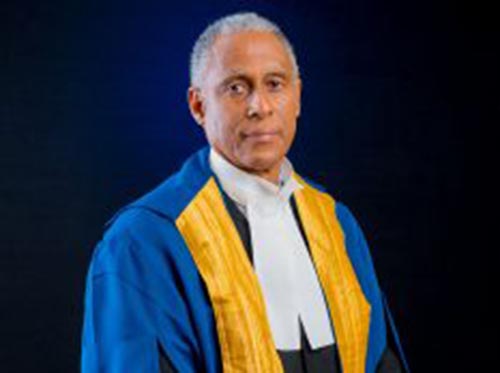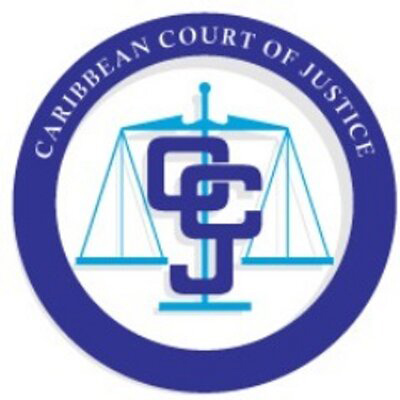The Caribbean Court of Justice (CCJ) has declined to fix timelines for general elections, which it says should be held in accordance with the Constitution following the December 21st, 2018 passage of a motion of no-confidence against the APNU+AFC government and it has further established that a “caretaker” administration now exists.
Delivering the eagerly awaited unanimous judgment of the Trinidad-based court of last resort for Guyana, CCJ President Justice Adrian Saunders yesterday expressed the court’s hope that political actors on both sides would exercise their responsibilities “with integrity,” and in accordance with the Constitution. In the approximately 30-minute long session at the seat of the court in Port of Spain, Justice Saunders said that given the passage of the no-confidence motion against the Guyana government on December 21st, effect has to now be given to Article 106 (6) and (7) of the Constitution.
Article 106(6) states, “The Cabinet including the President shall resign if the Government is defeated by the vote of a majority of all the elected members of the National Assembly on a vote of confidence.”

Article 106(7) adds, “Notwithstanding its defeat, the Government shall remain in office and shall hold an election within three months, or such longer period as the National Assembly shall by resolution supported by not less than two-thirds of the votes of all the elected members of the National Assembly determine, and shall resign after the President takes the oath of office following the election.”
The court had set yesterday to issue orders based on its findings that the December 21st, 2018 vote of no-confidence against the APNU+AFC administration was validly passed, thereby requiring elections, and that the Chairman of the Guyana Elections Commission (GECOM) was unlawfully appointed. It had asked both the government and the opposition PPP/C to make submissions by July 1st on what the orders should be.
Stabroek News had previously reported that Attorney General (AG) Basil Williams had submitted to the CCJ that it should order government to return to the National Assembly to pass a resolution to extend the time to hold elections and, if this was unsuccessful, that the President dissolve the House and fix a date for the polls.
Opposition Leader Bharrat Jagdeo, for his part, had asked the CCJ to order the APNU+AFC administration to hold elections no later than September 18th and that the GECOM Chairman be selected within 10 days from yesterday.
The CCJ yesterday, declined those requests.
Granger subsequently reiterated that the appointment of new GECOM Chairman is among the prerequisites for credible elections, while Jagdeo reiterated his call for polls to be held by September 18th.
‘Clear meaning’
Noting that it is not its place to make coercive orders or set timelines dictating when elections are to be held, the CCJ said that government ought to resign and elections be held in accordance with the Constitution. It said too that the “caretaker” government that now exists ought to behave in a manner so consistent, specifically restraining the exercise of its legal authority.
Justice Saunders, in his address to the court, said that due observance of constitutional democracy and the rule of law in Guyana rests in large measure with the conduct of the various branches of government – the President and the Cabinet, Parliament and the Judiciary. He said that all must be “faithful to the spirit and letter of the Constitution and operate within the parameters given to each by the Constitution.”
Referencing Article 106 (6) and (7) Justice Saunders said that while the judiciary interprets the Constitution, these particular provisions require “no gloss” on the part of the court in order to render them intelligible and workable.
“Their meaning is clear,” he said, while adding that “it is the responsibility of constitutional actors in Guyana to honour them.”
The court declared that upon the passage of a vote of no-confidence, the article requires the resignation of the Cabinet including the President, while noting that it goes on to state that notwithstanding its defeat, the government shall remain in office and that an election shall be held within three months, or such longer period as the National Assembly shall by resolution supported by not less than two-thirds of the votes of all the elected members of the National Assembly determine.
Justice Saunders highlighted in the court’s ruling that GECOM has the responsibility to conduct that election, while emphasising that GECOM, too, must abide by the provisions of the Constitution.
The court then went on to pronounce that given the passage of the no-confidence motion on December 21st last year, general elections in accordance with the Constitution should have been held no later than March 21st of this year, unless a two-thirds majority of the National Assembly had resolved to extend that period.
The court observed that the National Assembly is yet to extend the period. It was further noted that the filing of court proceedings in January challenging the validity of the motion effectively placed matters on pause, but the CCJ would have rendered its decision on June 18th.
On this point, Justice Saunders said, in the judgment of the court, Article 106 of the Constitution vests in the president and the National Assembly, and implicitly in GECOM, responsibilities “that impact on the precise timing of the elections which must be held.”
Against this background, Justice Saunders made it clear that “it would not therefore be right for the court, by the issuance of coercive orders, or detailed directives, to presume to instruct these bodies on how they must act, and thereby preempt the performance by them, of their constitutional responsibilities.”
The judge said it is also equally “not the role of the court to establish a date on, or by which the elections must be held, or to lay down timelines and deadlines that, in principle are the preserve of political actors, guided by constitutional imperatives.”
Justice Saunders said that the court must assume that these bodies and personages will exercise their responsibilities “with integrity,” and in keeping with the unambiguous provisions of the Constitution, bearing in mind that the no-confidence motion was validly passed long ago.
‘Restrain’
Of note, however, Justice Saunders said it was important for the court to make the point that in mandating that the government shall remain in office notwithstanding its defeat, Article 106 envisages that the tenure in office of the Cabinet, including the president, after the government’s defeat, is on a different footing from that which existed prior to the vote of no-confidence.
On this point, the judge said that government continues in office as a “caretaker government or an interim government” until the next elections ensue and a president is appointed or re-appointed, depending on the results of that election.
The CCJ noted in its ruling that by convention, the government is expected to behave during that interim period in a manner consistent with being a “caretaker…and so restrain the exercise of its legal authority.”
Justice Saunders said it is this caretaker or interim role which explains the three-month deadline in the first instance that the article lays down in principle, for the holding of the fresh elections.
The judge said it was after having regard to constitutional stipulations that the court made the declaration and orders that the provisions of Article 106 (6) and (7) apply to a no-confidence motion.
He reiterated the previous ruling of the court, too, that it is 33 votes which constitute a majority of Guyana’s 65-member National Assembly and noted that while government defector Charrandass Persaud, who voted in favour of the opposition-sponsored motion was ineligible to be elected to the Assembly because of his dual-citizenship status, his vote on the motion was valid.
In making its declarations, the court went on to say that nothing in the anti-defection regime established that Article 156 (3) of the Constitution rendered Persaud incapable of casting his vote on the motion in the manner in which he did.
That article states, “A member of the National Assembly elected on a List shall cease to be a member of the Assembly, if – he or she declares in writing to the Speaker or to the Representative of the List from which his or her name was extracted that he or she will not support the List from which his or her name was extracted.”
Further rendering the court’s declarations, Justice Saunders said that the National Assembly properly passed the motion, and upon its passage, the clear provisions of Article 106 (6) and (7) immediately became engaged.
Meanwhile, in its award of costs, the court said that this is to be paid to Jagdeo and Persaud by the AG, while attorney Christopher Ram, who had filed the action arguing that elections ought to have been held within the three months following passage of the motion, was awarded 60 per cent of his costs which also are to be paid by the AG.
On June 18th, the CCJ ruled that the no-confidence motion was validly passed with the votes of 33 members of the 65-member House, thereby compelling the resignation of Cabinet and the holding of general elections.
In addition to discrediting the 34-majority argument which government advanced was need for passage of the motion, the court also dismissed government’s contention that Persaud’s vote was invalid because he is also a citizen of Canada.
Following the June 18th rulings, the court had given both the government and opposition an opportunity to arrive at consequential orders which ought to be made. Neither sides, however, arrived at any consensus on the way forward.
The court had, however, previously made it clear that while it was giving the two sides an opportunity to agree on orders to be made, it would give effect to constitutional requirements, if no consensus could be arrived at.
The three matters heard and consolidated by the CCJ were that filed by Ram; private citizen Compton Reid, who contended that Persaud ought to have been disqualified from voting as he was a Member of Parliament in violation of the Constitution because of his dual citizenship; and Jagdeo, who opposed government’s contention that 34 votes, and not 33 votes, were required on the motion, for its collapse.
The motion was declared passed by Speaker of the National Assembly, Dr Barton Scotland following the vote in its favour by Persaud on the night of December 21st. His vote tipped the scales 33 to 32 in the motion’s favour.
Though initially accepting passage of the motion, the government, through its AG and Legal Affairs Minister, Williams, subsequently did an about-face, arguing that the majority needed for the motion to have been considered passed was 34 and not 33, which, it contended, was an “absolute” majority and not merely a “simple” majority.
Following a challenge by government in the High Court, Chief Justice (Ag) Roxane George found that even though Persaud was made a parliamentarian in violation of the Constitution, his vote was valid and the motion was validly passed. She also ruled that the passage of the motion should have triggered the immediate resignation of the Cabinet.
The Guyana Court of Appeal, by a majority decision on March 22nd, overturned the Chief Justice’s ruling, saying that the correct mathematical formula for finding the “absolute” majority was not used.
While Chancellor Yonette Cummings-Edwards (Ag) and Justice of Appeal Dawn Gregory agreed that 34 votes were required for the motion to be carried, Justice of Appeal Rishi Persaud dissented.
Justice Jacob Wit – one of the five judges who presided over the appeals before the CCJ, had said that no magic was needed in determining what constituted the needed majority, while noting that attorneys for the state sought to work what he called “their legal magic,” with which they succeeded in persuading the local appellate court that a minimum of 34 votes constituted the majority that was required.






